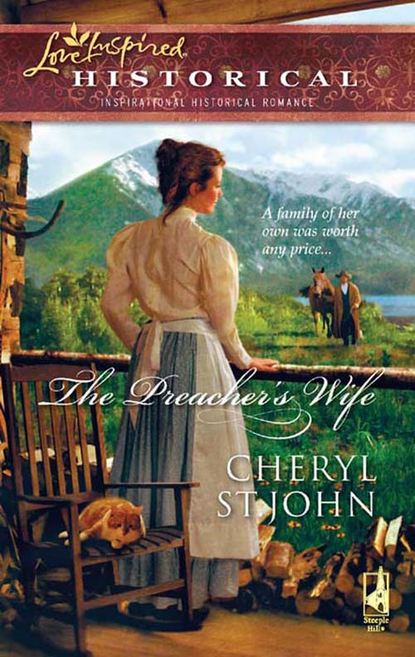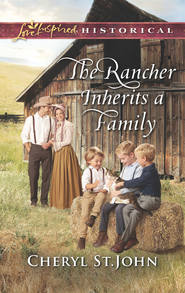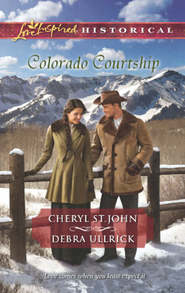По всем вопросам обращайтесь на: info@litportal.ru
(©) 2003-2025.
✖
The Preacher's Wife
Настройки чтения
Размер шрифта
Высота строк
Поля
Chapter One
Durham, Nebraska, June 1869
Only her husband’s physical body lay beneath the lush grass in the fenced-in cemetery behind the tiny white church. His spirit had gone on to be with the Lord, but her mother-in-law insisted that Sunday afternoons were for paying respects to the dead. Josephine Randolph knelt and pulled a fledgling weed from beside the flat piece of granite engraved with her husband’s name.
Margaretta slipped a lace-edged hankie from the hidden pocket of her emerald-green dress and dabbed her eyes. “He was too young,” she said for the thousandth time. “Too young to lose his life.”
Josie nodded. It had been three years, and while she had mourned her husband’s death and missed his company, there were no tears left. She had loved him. She had been a good wife. But in his affections she had always taken second place to her mother-in-law. She hastened to remind herself that losing a son or daughter was devastating. Margaretta had lost her only child. Of course the woman was still suffering.
“It would be easier if I could take comfort in the fact that he’d left behind a living legacy.”
Knowing and dreading what was coming next, Josie got up and brushed her palms together.
Margaretta sniffed into her hankie. “Your inability to give me a grandchild is almost more than I can bear.”
Josie turned her gaze to the countryside, spotted an orange and black butterfly and watched it flutter on the breeze as she steeled herself.
“A child would have been a part of him I could hold on to. If only right now I could be caring for a little boy or girl with Bram’s features. I would have so loved to watch him grow. His child would have been such a comfort to me.”
Josie wanted to cry, too. She wanted to rail at the woman who made her feel every inch as insignificant as her son had. Didn’t Margaretta think a child would have been a comfort to her, as well? Didn’t she know that Josie’s loneliness was eating her up on the inside? Didn’t she think Josie wanted more out of life than…than…this?
Momentarily, she closed her eyes against the painfully blue summer sky. She’d never wanted anything more than a family of her own. She’d spent her entire childhood waiting for her circuit-judge father to return home. The times he had, he’d spared her only meager attention before leaving again.
Because Bram Randolph had been a local newspaperman, she’d known he wouldn’t be a traveler. She’d married him with the hope of a secure future. Time had proven Bram more concerned with the whims of Margaretta than the needs of his young wife, however. And that was the simple fact.
“You are coming to the house for dinner, aren’t you?”
And be exposed to yet another opportunity for Margaretta to pursue her weekly harangue about Josie’s barrenness? Josie opened her eyes. “I’m fixing a stew for Reverend Martin,” she replied matter-of-factly. “I’ll stay and keep him company.”
“He seems to be recovering well.” Margaretta smoothed the fingers of her beaded gloves. “Whatever you’re doing must be working.”
Josie managed a smile. “God’s doing His part, too.”
Margaretta gathered the hem of her voluminous skirt and walked across the thick spring grass toward the street.
Josie glanced down and read the headstone again. “Beloved son and husband.” Not father. Sometimes she felt so incomplete, so alone. She hadn’t given her husband children, and for that glaring inadequacy, Margaretta would never forgive her.
“Have a good afternoon!” she called after the woman.
Margaretta delivered a tepid wave and continued marching toward her home a few blocks away. Josie experienced the same relief she always did when her obligatory mourning session and weekly dressing-down was over. At least she’d had a good reason to forgo lengthening the torment by joining the woman for a meal. Margaretta’s house had a cold, depressing atmosphere that matched the woman’s attitude.
Josie glanced at the bright blue sky with a longing that was rising up so swift and strong that the ache took her breath away. She’d prayed for contentment, but she needed more than this. When she didn’t keep busy enough, she daydreamed of impossible things….
Taking a deep breath, Josie made her way with renewed purpose to the shaded two-story house beside the church. She climbed the back porch steps and let herself in. She’d started a stew earlier, and now checked the savory broth, adding water and salt.
“It’s Josie!” she called, removing her bonnet and sweeping along the hallway toward the front of the house.
“Who else would be banging pans in my kitchen?” came the good-natured reply.
She found Reverend Martin in his study, seated where she’d left him, on an overstuffed chair with a plaid wool blanket tucked around his legs. He closed his Bible and removed his spectacles, setting both aside. Last March he’d fallen from the roof of the church while replacing shingles, and had broken several bones, including his collarbone and ribs. A particularly severe break in his leg had become infected, and he’d been bedridden with a fever for weeks. Eventually he’d recovered, and was only now able to move from his bed to the study. The town doctor said it would likely be several more weeks before he’d be strong enough to resume his duties.
She’d always considered him a mentor, but these past weeks had made them friends, as well. “The fire’s died down,” she said. “I’ll get a few logs.”
“I can’t seem to get warm.” He was paler and thinner than before the accident, and the change in such a vital, life-loving man was heartbreaking. The man was probably only in his late thirties, but these past weeks had taken a toll. Josie had dedicated herself to seeing him recover to his former self.
“The stew will warm you from the inside out,” she assured him. She took two split logs from the box beside the fireplace and knelt to add them to the fire, then used the poker to adjust the wood until the flames caught and licked up around the sides. The bark snapped in the blaze. Warmth spread from the hearth to where the reverend was sitting.
“That’s nice,” he said with a grateful smile. “I barely have time to realize a need before you’ve seen to it.”
“It’s a privilege to help.”
“And a help you are. I don’t know what I would do without you.”
“God would send someone. But I was available.”
He chuckled. “You’re a woman of great faith, Josie, but you count yourself a little short.”
She seated herself on a nearby ottoman.
“A lot of people are available,” he told her. “Few are willing.”
She never doubted that God was taking care of the reverend. It was when she thought of her own needs that her confidence got a little shaky. “How about a game of checkers before dinner?” she asked.
He gave her a mock frown and flicked his hand as though shooing away a fly. “Do you think I enjoy your kings chasing my last disk around the board, delaying the inevitable?”
She laughed. “Oh, come now. You win sometimes.”
“Only if you feel particularly sorry for me and deliberately pass up chances to jump. We need a new game, one I have a hope of winning.”
“Based on chance, rather than skill, Reverend?”
“Didn’t I see you and James setting up the board the other evening?”
James, a fatherless lad of about fourteen, came by a few times a week to split wood and perform a few other chores. Josie had quickly sensed that, because his mother worked evenings at the café, James was lonely. She’d offered to teach him the game. “You did. He’s fast becoming an apt opponent.”
The reverend’s enormous calico leaped from its spot on the divan to run through the doorway into the nearest bedroom.
“Must be a caller,” the reverend said.
Most everyone knocked at the back door and then walked in, but a rap sounded at the front. Josie and the reverend exchanged a puzzled glance before she got up.
A broad-shouldered man in a brown hat and buckskin jacket stood in the dappled sunlight that filtered through the leaves of the twin maple trees. She had a sudden, swift impression of troubled intensity as his gaze bored into hers.
“Good afternoon, sir,” Josie greeted him.
He removed his hat, revealing thick chestnut hair in need of a cut. “Ma’am,” he said in greeting. “I’m Samuel Hart. The preacher sent by the First Christian Alliance.”
Behind him, three girls of varying ages waited in the street near a dusty team attached to a canvas-covered wagon.











